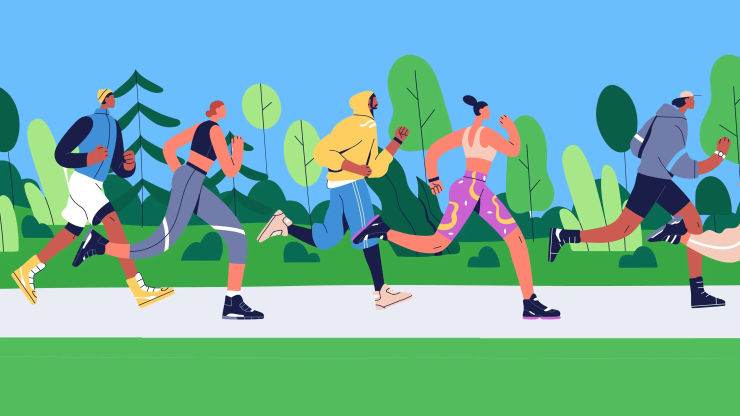Five uplifting stories from parkrun
It's enough to make you get up on a Saturday morning and run five kilometres.

parkrun – a regular, free 5K run at 9am every Saturday in parks across the world – started in 2004 when thirteen people turned up to a time trial in Bushy Park organised by Paul Sinton-Hewitt. Since then, it's grown into a global phenomenon, with over ten million people taking part. The genuine sense of community and inclusivity at the weekly events has made them into much more than a five kilometre run, and parkrun has become a healthy ritual and source of positivity and connection for many. To celebrate the release of Paul Sinton-Hewitt's memoir, One Small Step, which tells the inspiring story behind the movement, we share some uplifting examples of the positive role parkrun has played in people's lives.
'I really believe setting this goal to return to parkrun was instrumental to my recovery'
parkrun has long been an established part of Tom Vinten's life, offering a chance to be active, out in nature, and start his weekend on a positive note. 'It also gave me a foundation to build up my running ability,' says Tom, who has gone on to compete in 10Ks and half marathons.

In 2024, Tom was diagnosed with a Grade 4 Glioblastoma brain tumour and had to have emergency surgery within days of arriving in hospital, followed by radiotherapy and chemotherapy. As he recovered from his operation and went through treatment, getting back to parkrun became a helpful target to aim for.
'I really believe setting this goal to return to parkrun was instrumental to my recovery. I am so grateful to all at parkrun for making it such an inclusive event that is open to everyone.'
Just one month after surgery, Tom was able to walk his regular parkrun course in Woking. This gave him not only a real sense of achievement, but also a feeling of routine and order at an incredibly frightening and unpredictable time.
'To be able to partake in any sort of physical activity, even just walking the 5k course, was one of the most important opportunities given to me in the immediate aftermath of surgery.'
From junior parkrun to World Record breaker
In April 2024, Lloyd Martin became the youngest ever runner with Down's syndrome to complete a marathon, completing the London course aged nineteen with his mum, Ceri Hooper. Only a few months later, he went on to run the New York Marathon, and he is running in London again at this year's event on 27 April. And it all started with a rainy junior parkrun in Cardiff when he was twelve years old.
'Lloyd never ceases to amaze us,' says his mum, Ceri. 'He was born with a hole in his heart and we were told he would have poor muscle tone and may never walk and yet he’s proved all the medics and stereotypes wrong!'
Lloyd loves the social aspect of parkrun and it's the inclusivity and welcoming ethos of the events (all abilities are welcome: you can walk, jog or run) that have enabled him to really excel at the sport. parkruns form a regular part of his marathon training, enabling him to run safely and also keep up the social side of running which is so important to him. It also means he can work towards his next goal: a sub-thirty-minute parkrun.
'To me, parkrun means community.'
Janice, who is living with stage-four cancer, is currently unable to take part in the 5K, but that doesn't mean she can't take part in parkrun.
Janice became hooked on the weekly runs in 2015, and despite having to scale back following complications from her cancer treatment, was determined to reach the 250 parkrun milestone. 'The last twenty parkruns that I did. . . were parkwalks with walking poles, a hydration vest, and a lot of willpower,' she explains.
Janice was diagnosed with breast cancer in February 2022 and after a reaction to immunotherapy, suffered damage to her kidney, thyroid and lung. Her resilience and determination to meet her 250 goal did not go unnoticed by her local parkrun team who organised a guard of honour at the finish line. Such determination is reflected in her continued volunteer work even though she is currently not able to walk the course.
'My favourite role is timekeeper, which I can do from the (sort of) comfort of a folding chair. Volunteering is a great way to stay involved and support the parkrun community. I love seeing the regulars each week, and doing what I can to encourage other parkrunners.' And she doesn't intend to stop there, with a long term goal of returning to the 5K.
A parkrun love story
James didn't start running until he tried out a parkrun at forty-six, in contrast to Lynne who has been a runner for years, but their regular Saturday 5Ks are equally important to both of them. They love catching up with friends and getting the weekend off to a great start. Oh, and maybe fitting in the odd proposal along the way.
'I was volunteering as a tailwalker [a person who walks behind the participants]. I got about a third of the way round the course, when I saw he was standing there with some marshals. I was completely amazed by what happened next and, of course, I said yes!'

As parkrun had been such an important part of their story – when they first met, James and Lynne regularly planned dates around runs – the couple decided they had to incorporate a parkrun into their wedding day, and it ended up coinciding with their local Cusworth parkrun's 200th event. 'The stars aligned perfectly – it was just meant to be!' says Lynne.
From running alone in South Africa to running with ten million people across five continents
Paul Sinton-Hewitt has always found comfort and consolation in running. Growing up in care in 1960s South Africa, it was a simple, free source of entertainment and self-worth through a complicated, isolated childhood. He continued running throughout his life, moving to the UK and building a successful career. But then everything fell apart. He lost his job, and his marriage broke down – and an injury meant he risked being cut off from his main lifeline: his running club.
In search of connection and purpose, Paul came up with a simple idea. He started a weekly time trial run in Bushy Park, near where he lived. It was every Saturday. There were no winners or losers. It was always free. And it was always there, whatever the weather, even on Christmas Day, even if no-one else turned up. Thirteen runners came to that first parkrun in south west London. Twenty years later, ten million parkrunners meet across five continents in search of health, happiness and community.
Read Paul's full story in his own words in One Small Step.
One Small Step
by Paul Sinton-Hewitt
This is the story of a simple idea that turned into a global movement. This is the story of parkrun, told for the very first time by the man who started it all. Filled with hope and optimism, One Small Step is a powerful affirmation of how coming together in simple ways can change our own lives and might even change the world.



